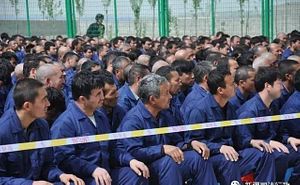Amid international concern for the mass incarceration of Uyghurs and other Muslim minorities in China, growing awareness in Taiwan toward the Uyghur crisis particularly stands out – as it indicates how human rights issues and religious freedom in China could have ramifications on cross-strait relations and regional affairs.
To date, the Chinese government has refrained from disclosing the exact number of Uyghurs and other Muslims arbitrarily detained in its concentration camps – justified as “vocational training centers” by Beijing – scattered across the Xinjiang region. Recent actions by the Chinese government have shown no progress in addressing concerns of the international community. Just the opposite, in fact – Beijing exerted pressure on other countries to warn them against attending a side event on Uyghur rights at the United Nations Human Rights Council in Geneva.
In Taiwan, discussions on the Uyghur concentration camps – including media reports as well as remarks by political and opinion leaders – have interpreted China’s abysmal treatment of its own citizens as an indication of what could befall Taiwan if it is brought under the rule of the People’s Republic of China (PRC). In particular, the infringement of freedom in areas such as Xinjiang, Tibet, and Hong Kong highlights China’s inability to govern regions with diverse historical and cultural trajectories within its own borders, while also leading to heightened distrust toward China’s intentions to annex Taiwan under its proposed scheme of “One Country, Two Systems.” In this context, Chinese assurances to respect Taiwan’s existing political institutions under such an arrangement are rendered hollow and even absurd. Meanwhile, the recent verdict that convicted leaders of Hong Kong’s 2014 Umbrella Movement to prison also displays the authoritarian nature of Beijing’s rule.
Religious freedom – especially the Chinese government’s oppression of Muslims, Christians, and Tibetan Buddhists – came under the spotlight in Taipei during a regional forum in March, co-hosted by the Taiwan Foundation for Democracy and the American Institute in Taiwan (the de facto U.S. embassy). Titled “A Civil Society Dialogue on Securing Religious Freedom in the Indo-Pacific Region,” the forum featured speeches by President Tsai Ing-wen and U.S. Ambassador-at-Large for International Religious Freedom Samuel Brownback. Drawing participation from Uyghur and Tibetan activists, as well as delegates from 15 countries, the event underscored strong cooperation between Taiwan and the United States on values-based diplomacy, while cementing Taiwan’s role as a regional hub for human rights.
Following the forum, the ruling Democratic Progressive Party (DPP) released a short video on social media titled “Support Uyghurs, Protect Taiwan,” featuring interviews with several Uyghur activists visiting Taiwan, including Nury Turkel of the Uyghur Human Rights Project, Rushan Abbas of the Campaign for Uyghurs (both U.S.-based), Enver Tohti Bughda from the U.K. Uyghur Association, and Ilham Mahmut from the Japan Uyghur Association. The DPP stressed that China’s actions violated universal human rights values through its concentration camps and invasive “homestay” policies, adding that support for the Uyghur community should be a bipartisan cause in Taiwan. Commenting on the Uyghur plight, DPP Secretary General Luo Wen-jia has stated, “Like the air we breathe, it is often difficult to perceive the existence of freedom. However, once freedom is lost, it will never return. Show support for the Uyghurs in concentration camps under Chinese rule.”
Moving beyond the political arena, the situation in Xinjiang has received attention from traditional and social media in Taiwan, with comments from talk-show pundits, celebrity vloggers, and religious groups. Developments in Xinjiang have struck a nerve as they shed light on how Communist rule could drastically alter Taiwan’s existing democratic way of life. The Chinese government’s treatment of Uyghurs clearly infringes upon values that are cherished by Taiwanese society, including political and religious freedom, which carry particular importance as a result of relatively fresh memories from Taiwan’s own recent history in its transition to democracy.
Given China’s economic slowdown, with its annual economic growth rate at its lowest since 1990, what also comes into question is whether such intense methods of oppression can remain financially sustainable. It is no secret that, at $200 billion, China’s expenditure for domestic “stability maintenance” (weiwen) last year far surpassed its defense budget of $180 billion. Xinjiang remains among the top three Chinese provinces in terms of “stability maintenance” costs. The fact that large amounts of economic resources are devoted to costly projects on enhancing control, such as concentration camps or facial recognition technology, may create further economic risks for China ahead.
In stark contrast with China’s war on religion, Taiwan has made efforts toward creating a friendly environment for Muslims and other religious minorities. Under Taiwan’s New Southbound Policy, particular attention has been devoted to promoting increased cultural understanding between Taiwan and its neighbors in Southeast Asia, many of which contain sizable Muslim populations, such as Indonesia and Malaysia. This includes initiatives such as celebrations of the Eid al-Fitr festival, which marks the end of the Islamic month of fasting, Ramadan, as well as the establishment of Halal food certification systems to attract more international tourists. Here in Taiwan, religious institutions are seen as testaments to the nation’s freedom and diversity, instead of being hastily labeled as “extremist” threats to the authorities. This makes it all the more important for Taiwanese to show support for the Uyghur community in their demands for the Chinese government to stop its ongoing atrocities.
Wen Lii is Spokesperson for the Democratic Progressive Party, Taiwan. He is an analyst on regional security issues and Southeast Asian affairs.

































